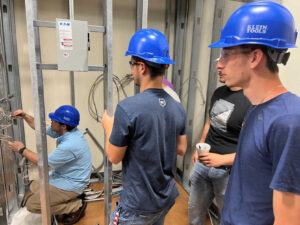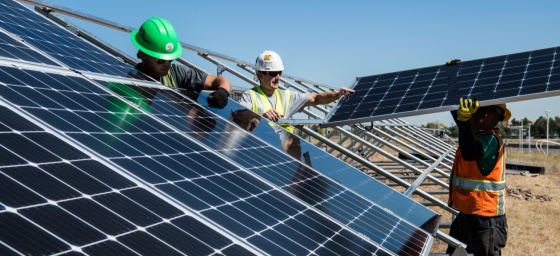Electrician Pasadena is a person who works with electricity. They can be found working in residential, commercial, or industrial settings.

Electricians have a high level of skill and knowledge. They must be able to read technical and wiring diagrams as well as have physical stamina. They also need to be honest with their clients.
Electricians install the wiring, electrical components, and fixtures that are necessary to move power from electricity grids to homes, businesses, and other buildings. They also inspect and maintain those systems to ensure they’re functioning properly. This can include things like rewiring circuits, replacing old or damaged components, and repairing electrical devices.
When something goes wrong with an electrical system, it’s the electrician’s job to troubleshoot the problem and determine what caused it. They use a variety of tools and testing equipment to identify issues with circuits, switches, and other components. They can then make repairs or replace them as needed to restore functionality.
This can be anything from a simple bulb replacement to an entire building remodel that involves new lighting, outlets, and other upgrades. Some electricians specialize in commercial spaces, while others focus on residential or industrial work. Depending on the needs of the client, they may collaborate with other professionals or contractors to design and implement an electrical system that meets specifications.
In addition to standard hand and power tools, electricians often use specialized devices like multimeters to test voltage and other factors. They also need to be familiar with the latest technologies in their field, as well as any changes or updates made to industry codes and regulations.
Electricians can choose to work for themselves as independent contractors or for larger companies that hire them on a contract basis. They can also choose to take on additional responsibilities, like overseeing apprentices and other electrical workers. Some electricians even opt to pursue mastery in their field, which requires additional education and training and the acquisition of a license.
If you’re looking for a job that pays well and doesn’t require a college degree, becoming an electrician is a great option. Most electricians undergo on-the-job training as apprentices before becoming fully licensed and qualified for their positions. This means you can start earning money right away and avoid accumulating student loan debt that could hold you back in your career. It’s also a great way to get hands-on experience in a highly technical profession that you can apply to your future career.
Troubleshooting and repairing electrical issues
One of the most important skills an electrician must have is troubleshooting and repairing electrical problems. This includes being able to identify the source of the problem and then finding ways to resolve it safely and quickly. Whether the issue is a faulty outlet, flickering lights, or a dangerous circuit breaker, it’s essential that any electrical issues are addressed immediately.
Electricians are also responsible for installing the wiring and other components that help transmit power to homes and businesses. This includes ensuring that these systems are connected to the electricity grid and can handle the amount of current being used. It’s also common for electricians to work on alternative energy systems, such as solar and wind turbines. This is a growing field that will likely require more electricians in the future.
Another thing that electricians must have is effective communication skills. They must be able to explain complex issues in a way that makes sense for non-technical people and keep clients updated on progress throughout the project. It’s also important for electricians to be able to deal with challenging situations and remain calm under pressure.
One of the most common signs that there is a problem with an electrical system is when outlets or light switches are warm to the touch. This is a sign that the wires inside are overheating and can cause fires if not addressed promptly. Electricians should always be careful when working with live wires and should use electrical tape to mark them as “hot” before testing them.
If you notice that your breaker box trips frequently, this could be an indicator of overvoltage in your home’s wiring or a damaged appliance. You can try unplugging some devices and see if this fixes the problem, but if it happens repeatedly, you should contact an electrician right away.
A blown fuse is another sign that something is wrong with the electrical system. It may be caused by overamping or a short circuit, and either way, it’s important to have an experienced electrician check out the problem as soon as possible.
Maintaining the electrical system in your home
Like a person needs yearly checkups, daily grooming, and a healthy diet, your home’s electrical system requires regular maintenance to keep it running at peak performance. It is also a great way to prevent costly repairs in the future.
Electricians prepare, assemble, install, test, and repair electrical wiring, fixtures, and related equipment in homes, buildings, and other structures. They work for electrical contractors or building maintenance departments, or they may be self-employed. They can specialize in residential, commercial, or industrial work.
If you’re thinking of becoming an electrician, the first step is to obtain a high school diploma or GED certificate and then enroll in a vocational training program. Most electricians receive their education through apprenticeship programs, which include both classroom instruction and hands-on field experience. After completing the apprenticeship program, an electrician can apply for a license.
A licensed electrician must be familiar with state and local electrical codes, including blueprint reading. It’s important for them to be able to read and understand technical diagrams so they can determine which wires connect to specific devices or power sources. They need to know how to use different types of hand and power tools, such as conduit benders, screwdrivers, and wire strippers.
Another important skill an electrician must possess is communication skills. They often work with customers, so it’s vital that they are able to explain complex electrical issues in ways that everyone can understand. They must also be able to answer questions about the status of their electrical systems and what the best course of action is for each situation.
It’s important for homeowners to regularly perform basic electrical maintenance tasks, such as resetting circuit breakers, cleaning dust from outlets and switches, and replacing light bulbs. This can help reduce the risk of fires and electrical shocks. It is also a good idea to have a licensed electrician inspect your home’s wiring, especially if you notice signs of wear and tear such as burning smells or discolored outlets or switches.
The safety of your family depends on the electrical system in your house. Leaving it in disrepair can lead to dangerous conditions, such as overheating or short circuits that could cause fires. Be sure to turn off the power source to any device or fixture you are working on before beginning a task and follow all other safety precautions.
Creating a Safe Environment for Your Family
Electrical disasters happen, and when they do, people need someone to help get the power back on. Electricians are the modern superheroes of the electrical world. They spend their days working on a variety of tasks related to electricity, including installing wiring and fixtures, inspecting equipment for safety, and repairing electrical systems.
Electricians are responsible for complying with local and national electrical codes and safety standards. They also take a proactive role in creating a safe environment for their customers by grounding systems, installing protective devices like circuit breakers, and taking other steps to prevent fires and other dangerous situations. They also use a variety of tools to perform their job, including hand and power tools such as conduit benders and wire strippers and test equipment like ammeters and voltmeters.
Depending on their specialization, electricians may work in residential settings or on large industrial and commercial construction projects. They are often employed by electrical contractors or building maintenance departments, but they can also choose to be self-employed. Self-employed electricians often work in residential construction and can set their own schedules.
An apprenticeship is one way that aspiring electricians can gain the experience and skills necessary for this career. In addition to hands-on training, apprentices are typically required to complete a series of courses and pass an exam before they can start working independently. This includes coursework in math, reading, and physics, as well as an overview of national electrical code requirements and the latest safety protocols.
While the work of an electrician is challenging, it can be rewarding as well. Whether it’s helping a homeowner regain power after a storm or responding to calls about outages in the middle of the night, the skills that these professionals acquire throughout their careers can make them valuable members of society.
If you’re interested in becoming an electrician, contact your local vocational school to find out more about the programs that they offer and how to apply. You’ll need to have a high school diploma or equivalent and complete an apprenticeship program before you can begin work as a licensed professional.





